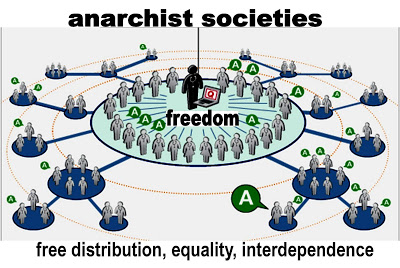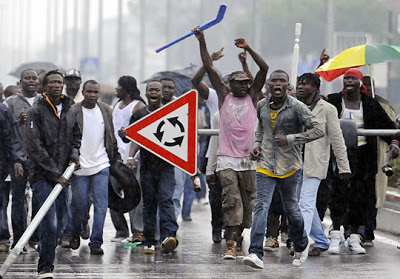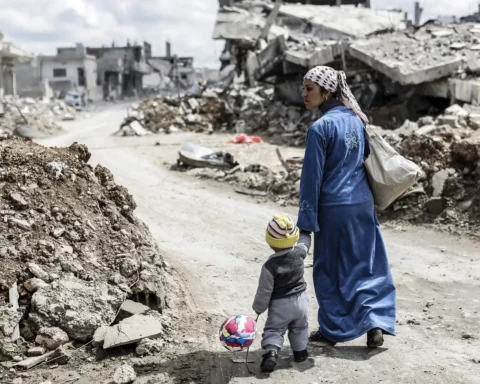
Of walls and flows: An interview with Manuel Castells by the Voices of Resistance from the Occupied London
(This is a longer version than the one appeared in print in the free magazine of the collective, which had to be edited down for space purposes -eds.)
In “The Rise of the Network Society” ((‘The New Economy’, chapter in “The Rise of the Network Society” (1996), Oxford: Blackwell pp. 77-163)) you provide a portrait of the new political economy of the globalisation of sovereignty. There, you suggest that in the 1990s there were a number of institutional shifts which lifted the barriers set in the 1930s and 1940s as a response to the 1929 depression (ibid: 152-153). These shifts evidently comprised a cornerstone of the neoliberal, free market project… But could they also be signaling the beginning of its end?
In the 1980s capitalism proceeded to a successful restructuring that lifted it from the crisis of the 1970s by escaping many of the regulations set up in the late 1940s to escape the crisis of the 1930s and its sequel of wars. Then followed in the 1990s until 2008s a period of high growth and global expansion, of course punctuated by crises as usual, but with the capacity to incorporate into capitalism hundreds of millions of people around the world. This is not neoliberalism (an ideological term that does not have much analytical value) but simply unfettered global capitalism. Social movements and alternative policies challenged this new form of capitalism, `particularly in Latin America, but overall it was a triumphant moment for capitalism, not the least because its rival system, statism, collapsed entirely – China surviving and prospering by joining global capitalism. The 2007-2008 financial crisis, to be followed by a global recession, signals a halt of this model of unregulated capitalism and opens a new era whose contours cannot be predicted as they depend on the outcomes of social struggles and political competition, including the new perspectives created by the election of Obama in the U.S.
The iconic event symbolising the collapse of state socialist ideology was, undoubtedly, the fall of the Berlin Wall in 1989. Is there an event, a moment that has occurred (or might occur in the near future) that the future historian would dub neoliberalism’s Berlin Wall?
While I do not accept to characterize the recent period as neo-liberalism, there is indeed a significant historical shift in 2007-2008, directly linked to the crisis of what I call virtual financial capital. As for an event, I think the collapse of Lehman Brothers, epitomizing the end of investment banks based on derivatives and futures will be retained by history as the defining moment, together with the election of Obama, not entirely independent from the financial crisis.
An elementary concept of proponents of “free market” and neo-liberalism had supposedly been that state intervention in the economy ought to be as minimal as possible. Recent events have shattered this principle and, while they could be signaling the death of free market ideology, an alternative reading of the events would parallel them to Giorgio Agamben’s understanding of the state of exception: A condition, that is, which through its very exceptionality comes to confirm the rule. A new form of sovereignty might therefore be emerging: a weaving net between the sovereignty of the state and its affiliate yet nevertheless dicey market. If this is the emerging landscape of sovereignty, what is the corresponding (to use Agamben’s terminology) form of bare life? And where do the potentials for political action and resistance lie in this very landscape?
Too many questions folded together. The notion of a non-interventionist state is pure ideology. The state plays a substantial role in all forms of capitalism, and not only politically but economically. Nation-states were the subjects of globalization, even if they lost margin of maneuver through their own actions. Financial deregulation was a state policy decision. Trade liberalization resulted from an agreement among states. Thus, the current wave of state re-regulation is not the return of the state (it never went away) but a new form of state intervention characterized by giving priority to the stability of the system over the benefit of financial oligarchies. The state was never fully sovereign, and there is still dependent on markets and on connections to other states. This is why I coined the concept of the network state as the state that characterizes the Information Age. The chances for political action increase in this context because the ideology of consumption is weakened by the difficulty to actually consume and because the open politicization of the economy offers a clear target for social mobilization than the abstract enemy of the global financial market.
In 1903, Georg Simmel referred to the blasé attitude as the most typical psychological condition in the metropolis: “The psychological foundation, upon which the metropolitan individuality is erected, is the intensification of emotional life due to the swift and continuous shift of external and internal stimuli” ((“The Metropolis and Mental Life”, included in “Man Alone, Alienation in Modern Society”, Eric & Mary Josephson, 1962)). In that way Simmel touched upon the results of this continuous shift of stimuli during the early development of the metropolis. His position brings to mind Walter Benjamin’s metropolitan shock as well as Bauman’s liquid modernity. They all highlight the importance retained in stable structures and relationships in the urban setting precisely at a time when these come under threat. Network technologies intensify the level of swift and shift of these stimuli, in turn intensifying the threat of rupture in stable relationships and structures. What is your position in relation to the said danger? What levels can the blasé phenomenon reach within the network condition (see for example the hikikomori phenomenon in Japan)? And how can the notion of community be defined today, amidst a fluid and network condition of constant shifts, swifts and transmutations?
I published a book in 1972, “The Urban Question” to debunk what I called “the myth of the urban culture”. Although the books presented a Marxist framework that by and large I consider superseded, it did make a number of important points, this being one of them. Spatial forms per se do not produce certain psychological reactions or social behavior. The notion of community was ideological nostalgia, and most of the so-called effects of the metropolis were in fact characteristics linked to the expansion of capitalism, the individualization of relationships under the influence of market relationships, and the dissolution of traditional forms of association. Similarly today, my empirical studies on the Internet have shown that we do not have less but more sociability in a networked context, but it is a different kind of sociability, what is know as networked individualism. There are communities, but of different types, from instant communities of practice to self-defined communities of resistance or of projects. The major trend, supported but not caused by communication technologies, is the culture of autonomy and the ability of people to define their own projects and build their own communication networks. Most of the characterizations are built by contrast to a mythical view of the industrial society or of the traditional societies. Most sociological theory nowadays is based on words, not on observation.
The notion of networks and by extension, the technologies resting upon them seems on the one hand to rely on the capacity for spontaneous-instant action and on the other, on complicating the conception and signification of space. It seems, in other words, to prioritise time over space, ending up nullifying the latter: nullifying space. Given this condition, what is the future of space and the relationships with it? And what is the future of physical presence?
I never say anything about the future. But what we observe is the formation of a different type of space, what I have characterized as the space of flows, in interaction with the space of places. In fact, space is the dominant dimension of our society because people build their practices of resistance in their places in opposition to the space of flows that characterizes the organization of power (finance, global deciders, the media), and articulate their places of resistance over the Internet making it the network of global resistance. On the other hand, contemporary capitalism uses technology to annihilate time, compressing it to the smallest possible fraction, so to squeeze more return in shorter time, and commodifying the future by transforming it into a futures market. Space organizes social life, time is obliterated by the negation of sequence in the new technological environment.
In relation to the previous question: When Hannah Arendt insists upon the importance of the presence of others for political action, she presupposes an in-between space, a political topos wherein freedom gains meaning – freedom as is visible in the eyes of others (e.g. in the agora, the polis). And when she touches upon the classic notion of the law (nomos) she reminds us this refers to the relationships between subjects and that these relationships require an in-between space in order to be articulated. In a network condition where the notion of space is liquefied, how can the political action in the presence of others exist? What type of in-between space is produced via network technologies and relationships?
This question is simply too complicated for me. Hanna Arendt is a normative philosopher, not an analyst. If you mean how network technologies enhance the chances for political action it is very simple: by increasing the chances for people to network with each other. Since state power and capital power is based on disconnecting people, workers, and citizens, so to make their common interests more opaque and their fighting chances less coordinated, anything that helps connection helps social change. You do not need fancy words to say that. Make things simple, they are usually more simple than our concepts. Some social scientists use abstraction to enhance their status rather than their knowledge.
Could it be argued that contemporary technologies are politically neutral? They might offer exceptional capacities in the age of information, yet they simultaneously hold a decisive role in the process of the creation of citizen-subjects. For example, the capacities of mobile telephony train the user to accept the condition of being always approachable, always available. In this sense, they seem to create, together with closed circuit surveillance systems, a condition of complete and permanent presence and of control of that very presence. Visual access meets the compulsory aural response and thus, aural detection (aural omnipresence).
Effects of technologies depend on the social practice in which they are embedded, so in principle they are not conservative or progressive. On the other hand, some technologies have properties that maximize certain effects, such as Internet or wireless communication supporting mobility and free communication. However to reinforce freedom does not solve the problems of the uses of freedom. You can be free to kill. And yes, digital communication both increases freedom and the chances for surveillance. This is why discussions of technology in general are useless. All depends on context and on process, and ultimately on the specific research on specific technologies in specific contexts.
An example highlighting the inversion of technology’s potentially liberating capacities: The demands of the autonomist movement (influenced by Deleuze and Guattari) for flexibility, ephemeral relations, nomadism etc. were absorbed and recuperated by capital and state formations in such ways, that today we witness the descendants of this movement organising against the precarity brought with the way of life it had itself demanded. This brings up, once again, the element of stability and continuity, this time at the level of social movement procedures. To what extent could it be argued that these demands were unbearable first and foremost for those who were the first to experimentally set them? And what space exists for redefining them today, when the technologies of information impose this liquid condition as an urban axiom built upon the importance of control and security?
No idea about what you mean about liquid condition, another of these fancy terms to say societies have changed (but were they solid earlier? When? How?) What we observe is that social movements are constructed around share practices rather than formal organization, and around the capacity to connect global networks with local existence. Thus, networking technologies are a constitutive element of the new social movements, such as the movement for global justice or the environmental movement.
In dealing with networks there are two distinct elements, the flows within them and their physical disposition – the networks’ own materiality. An archetypal network is that of the roads: Paul Virilio suggested that modernity is a dromocratic revolution, naming the motor-roads as the exemplary signifier of modernity. While you talk about spaces of flows and in particular, about the flows as such the motorway networks seem to be under-reported in your work. Can you elaborate on the materiality of road networks and their role in the contemporary network society?
Road networks, and any kind of transportation networks are certainly a major component of the space of flows, particularly high speed, high volume transportation networks. I emphasized more electronic networks because of their capacity to favor simultaneity without contiguity, the major feature of the space of flows. But in fact, all communication and transportation networks are electronic, as cars, trains, container traffic and the like are based on networked computer systems.
In an article published by Catalonia’s La Vanguardia ((“Neo-anarchism”, 21.05.2005, available online in English at http://www.negations.net/neo-anarchism-by-manuel-castells/)) you argue that anarchism might seem to be “an ideology for the 21st century”. This is a very tempting proposition and yet, the following question emerges from it: Given that as you state yourself, it is the “old” anarchist doctrine that has become suitable for our time (after being ahead of its own), why is there a need to describe it as “neo-” anarchist? And secondly, if it is true that anarchism’s newly-found relevance is based more on a structural disposition, a failure of communist governments to absorb productive forces and equally of capitalism to prevent undermining the foundations of the nation-state that fed it: If anarchism’s relevance is being initiated by these structural failures, to what extent could we be talking of anarchism, rather than anarchy emerging? And crucially, how can social movements and civil society make sure that we head for one, rather than the other?
The main ideas of anarchism (anti-statism, freedom, communes, peace, international solidarity, rejection of bureaucratic organizations, love of nature, gender equality, and the like) are present today as they were in the 19th century. But similar ideas in an entirely different historical contexts have a somewhat different meaning, this is why I call it neo. The main proposition is that the new technological environment and the network society induce social and political conditions in which Marxist categories appear to be obsolete while the Anarchist themes resonate with current social movements. Anarchy is utopia, anarchism is ideology. Social movements are increasingly rooted in anarchist themes, even if they would not call themselves anarchists. However, what will be the historical outcome of the practice of these social movements is an open question.
Some times, resistance movements blocked a society without the capacity to advance an alternative organization and they provoke a violent reaction from conservative forces that restores the law and order of bureaucracy and capitalism. What some militants propose in a variety of social movements is to conceive a society made of local free communes that become able to manage the complexity of a large-scale society via networking technologies and deliberative virtual spaces. Since we are fast moving to a hybrid social organization in which virtuality and F2F interaction are intertwined, this is an interesting mobilizing utopia. The current global crisis (financial, economic, environmental) is creating the conditions for mass support to alternative projects. The glue of the system has been consumerism. The market economy is based on relentless expansion of demand, and social integration is based on the endless desire to consume everything, thus transforming life into commodity. Now, if we cannot get credit to consume, the economy stops, but also stops the culture. We are moving, objectively, to an economy of austerity, in which demand cannot be fueled artificially by irresponsible lending and borrowing. This is the moment when many people may start asking questions about their lives, about the profound stupidity of our system, running and ruining our live without knowing for what, and burning ourselves in consumption that actually does not make sense for ourselves. So, our ideas may change on a mass scale, we can communicate these new ideas on a mass scale, and if we start living differently on a mass scale, those trapped in the impossible dream of keep on consuming, may join the nearest commune. In the choice between dying capitalis, repressive statism, and experimentation with freedom, I think alternative ways of living have a chance to offer hope.
You have noticed the contradiction of violence during protest: it attracts the attention of mass media but at the same time you suggest that it alienates the so-called silent majority from the movement – and you furthermore argue that the majority of participants dislike violence altogether (‘The Power of Identity’: 156-157). You mentioned recent, at the time, examples of Genova and Barcelona, but on-the-ground experience in both instances showed that when the state escalated its own levels of violence a large proportion of non-black-block activists, of activists who went to those cities to protest using passive resistance techniques decided to react using direct violence against the violence of the state. In the case of Genova in 2001 in the aftermath of the demonstration many non black-block participants confronted peaceful tactics that were used in line with pre-demonstration decisions, arguing that since the state was using so much violence, remaining passive was equal to the victimisation of an entire movement. Could you elaborate on the violence used by activists during protests?
I think the more violence you use the more you are trapped in the script of a television show, and the more you create a distance between the movement and people at large, many of whom share the values of the movement but not the tactics of a vocal minority. Yes, the system is institutionalized violence. But you do not overwhelm violence with violence, because even if you were able to do it (a rare occurrence) you recreate a violent, bureaucratic state, this is what history shows. You dissolve violence with words and images, you delegitimize violence, you engage in mass, non violent protests, and you start living in a different way without asking permission to anybody. The powers that be are interested in provoking violent confrontation, so to assimilate anarchy to chaos, when in fact, anarchy is a superior order, the order constructed from freedom.
When referred to your work is often distinguished in two distinct periods (the so-called “old” and “new” Castells). How do you feel about this distinction and further, about the often-found obligation in academia for one to retain a unchanged position throughout their career? How does that compare to one’s political orientations and possible changes to the latter?
I never think of myself as a theorist, and so, I am just amused by this categorization. I am a researcher, a worker of social science research, and in different periods of my life I did different types of research, and used different methodologies, and different conceptual systems to understand what I was studying. And I keep doing the same now. So, it is normal that I change the conceptual framework because I evolve, my work evolves, and more importantly, the world evolves. When theory does not match reality, I throw away the theory rather than forcing useless concepts on the complexity of what we observe. But I find essential not to build closed theoretical systems with the only purpose to win a share in the intellectual market of social theory. I always go back to the drawing board. It is so much more fun to try to understand new social forms and processes than to play with words. Theorists are usually very boring chaps. Do not fall in such a trap. Live in your practice, not in your books. Stay close to the facts, ask your own questions, and build your own conceptual systems with whatever is useful to your work. Ignore words or concepts that even their authors only half understand. Escape from theory courses, the last refuge of the intellectual gentry. Look around you and try to understand the world as it is, your world. And keep changing. The day you stop changing you are basically dead. Life is change. We live in a world of zombies that were programmed not to change. This is true for science, and also for politics. A different matter is some basic values, decency, dignity, democracy, equality, solidarity, intellectual curiosity, search of truth, as you understand them. This should not change, you should stick to the good values you got when you were young, the moment of openness, hope, and generosity. But which politics reflects these values keeps changing all the time, and you keep changing in finding out about political options. Keep living, thus changing. This is what I tried to do. In research as in politics. So, there never was a young and old Castells, because there was never a Castells. There was, and there is, myself, me as a person and as a researcher, resisting any reification (ummm, another fancy word: I can do it too!)
This article appeared originaly in:









